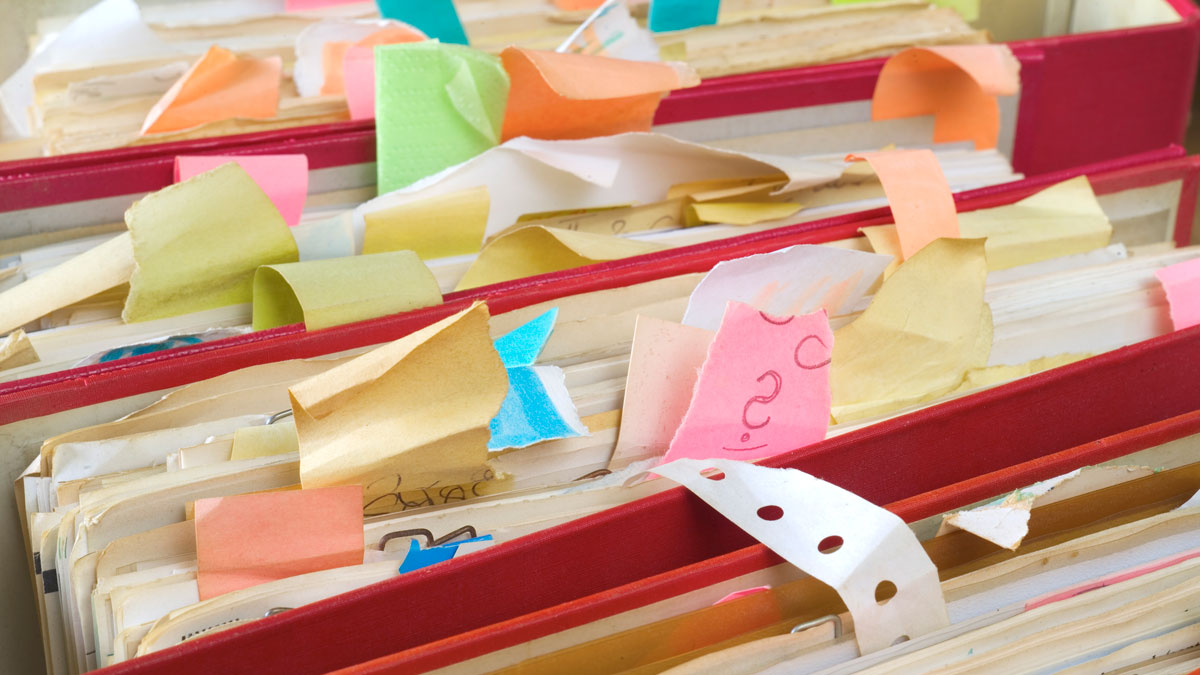How to organize estate documents to make life easier for your heirs

Now, more than ever, our lives are a complex tangle of physical and digital files – from your will, power of attorney, and property deeds to your online banking account and iCloud login.
When (not if) your family someday becomes responsible for your estate, they will be making tough choices during one of the most difficult periods of their lives. You can help them honor your wishes and preserve your legacy in the future by taking the time to organize and update your estate plan documents today.
Table of Contents
- 1 The importance of organizing estate and financial documents for heirs
- 2 Key estate planning and financial documents to gather for retirement (or any time!)
- 3 How to organize and secure your estate and financial documents
- 4 How to ensure heirs and executors have access to your estate plan
- 5 Why you should regularly update your estate planning documents
- 6 Professional help for organizing your estate documents
- 7 Final thoughts on how to organize estate documents
- 8 Start organizing your estate today
The importance of organizing estate and financial documents for heirs
Sam was more prepared than most; he had a complete estate plan. But he lived a busy, full life, and never got around to updating his plan or sharing the details with his wife, Ellie. When he passed away suddenly at 68, his grieving partner and adult children were left to navigate a maze of incomplete records, locked accounts, and red tape.
The family knew that Sam had purchased burial plots for Ellie and himself years ago but realized when making arrangements that no one knew where they were located. Sam’s funeral plans were in the air as the family searched old files and made frantic calls to local cemeteries. They located the plots in time for the burial, but the challenges didn’t stop there.
Sam managed all the banking and bills for his household. Logging into accounts and paying bills quickly became a nightmare because he hadn’t shared any passwords with his wife. Ellie faced delays and mounting late fees for months as she worked with the bank and creditors to regain access to their accounts.
Sam’s lack of organization created unnecessary stress and confusion for his loved ones during an already difficult time – something you can avoid for your family by simply organizing your estate documents.
*Situations and characters are fictional and designed to illustrate a concept.
Key estate planning and financial documents to gather for retirement (or any time!)
During a medical emergency, while you’re incapacitated, or after your passing, your spouse and heirs will need to make decisions for you regarding the care you receive, the maintenance of your home, the distribution of your estate, and more. They will need access to more information and documentation than you might think to carry out your wishes and protect themselves and your legacy.
- Personal identification documents: Your birth certificate, Social Security or permanent resident card, and marriage certificate will be necessary for creating a death certificate, claiming survivor benefits, and more.
- Financial documents: Make sure your spouse or a designated heir has access to bank statements, investment account details, and retirement accounts. It may also be helpful to share access to online account information with a trusted family member to ensure a smooth digital transition.
- Estate planning documents: Your will, living will, power of attorney, trusts, and healthcare directives will all play an important role in your care and passing.
- Property and insurance documents: You may be leaving a significant amount of wealth to your heirs through homes, vehicles, and life insurance. It’s much harder to pass those things on without the necessary documentation!
- Documents related to your home and family: A lot goes into your everyday life. Will the people you leave behind have everything they need to continue to care for your home, pets, or dependents? Consider things like maintenance contracts, veterinary records, contact information for your plumber, landscaper, and furnace technician, instructions for resetting the sprinkler system, the location and key code for your storage unit, and more.
No More Guesswork — Get Expert Insight Delivered Straight to Your Inbox Every Week
How to organize and secure your estate and financial documents
When it comes to how to organize financial documents, there is no one solution. The best organizational solution for you is one that is secure and fits the lifestyle and tech know-how of everyone involved.
Categorizing and managing your estate planning and financial documents
As you gather your estate planning documents and materials to organize financial files, you will find they fall into four categories:
- Original documents
- Copies and statements
- Account information
- Household information
You’ll want to consider how to manage each type of material separately because the right storage solution for one item may not work for the next (for example, your birth certificate and the log-in information for your auto loan).
Best practices for secure physical storage of estate documents
Physical storage comes with benefits and challenges. On the one hand, it’s vital to preserve original copies of certain estate and identity documents. On the other hand, physical documents can be easily damaged, lost, stolen, or destroyed. How you store your papers will depend on how sensitive the information is and how often you need to access it.
Original identification documents
Identification documents like your birth certificate and marriage certificate should be stored somewhere secure. This may be a fire- and waterproof safe in your home, preferably one bolted to the floor (thieves can and will take the whole safe if it’s not installed properly). A safe-deposit box at your local bank is a good option, too. Either way, make sure there’s a record of where these documents are stored so your heirs can access them when necessary.
Original estate planning documents
Original documents related to your estate plan, such as your will, trust, and power of attorney can be stored in your safe along with your birth certificate, but I recommend to clients that they leave these crucial documents with the attorneys who created their estate. This way, you know your documents will be secure and protected from theft, fire, and flood. The only caveat here is that you should check in every year or so to make sure your attorney is still in business – sometimes an attorney will retire or pass away, and your documents will move to another law office. In an emergency, it’s important that you and your heirs know where these critical documents are stored.
Financial statements and other documents
Bank statements, retirement statements, insurance policies, tax documents, and other items can be stored in a secure place at home. Unlike your Social Security card, it’s much easier to replace these items if they get lost or damaged, but take care – these documents still contain sensitive information that could be harmful if it falls into the wrong hands. A good place to keep such sensitive information is in a safe at home or perhaps a locked filing cabinet.
Household documents
If you own a home, you likely have a large collection of instruction manuals, receipts, and warranties. These documents aren’t that important, but they can make life easier for the next person to care for your household. These can be easily stored in a box or a filing cabinet. And if you haven’t looked at them in the last few years, take a moment to go through and discard the documents related to items you no longer own!
Some people like to assemble a binder or file that combines household manuals with items like service records and contracts, contact information for tradespeople, vet records, home instructions, and other things that will help keep your home and family running smoothly. If your garden is your life’s work, you might like to include names and locations of plants that require special care; or if you spent years fixing up a classic car, you might leave instructions to keep your baby purring.
Digital storage solutions for estate planning documents
Storing important documents digitally can have many benefits. With secure, cloud-based storage, you don’t have to worry about losing access to vital information. And you can easily share items with your spouse and heirs without the fuss of making photocopies.
Copies of important documents for easy access
Secure digital storage is a great solution for keeping copies of important documents, account statements, and any other items you want to preserve or share. Make sure you’re using unique, secure passwords for every digital service you use, and that your spouse or a trusted family member has access to the necessary login information.
My wife and I use digital storage to always keep copies of our medical directives and power of attorney documents on hand. This way, if something were to happen to me, my wife would have instant access to my wishes and documentation of her authority to make healthcare decisions for me. In a true emergency, this kind of organization can prevent a lot of confusion, worry, and red tape, and help your family to honor your wishes.
Passwords and login information
The average person has 168 passwords, according to a 2024 survey by NordVPN. The best way to keep track of all those passwords is to use a password manager (I often recommend Dashlane to my clients). Your password manager can be used to safely share individual logins with trusted family members or heirs so they will have access to important accounts should anything happen to you.
A password manager will help prevent you from writing down or reusing passwords, which are two major risks to your online security. And, when it comes time to share access with a spouse or trusted heir, you can do it directly through the password manager instead of exposing your password by emailing or texting it (or saving it in a spreadsheet. Don’t do that, either!).
Household information
Digital cloud storage is a great option for storing, organizing, and sharing information about your household. For example, you may choose to create a directory of important contact information or upload instructions for the upkeep of property and pets. Some people opt to scan or download pdf copies of manuals just to cut back on paper clutter.
How to ensure heirs and executors have access to your estate plan
The most meticulously organized estate isn’t any good if your heirs don’t know how to access it! As you gather, sort, and store your documents, consider who will need each item and how you can make it accessible to your executors and beneficiaries.
Communicating with your heirs and executors
As with estate planning itself, communication is an important part of organizing your estate documents. Your own mortality can be a tough topic, but it’s important to have these conversations and make your wishes and intentions clear. Your spouse, heirs, and/or executors will need to know what documents are in place, where to find them, and what roles each person will play.
Regardless of how your documents are stored (physical, digital, or a mix of both), I recommend creating a separate cover sheet or index that can be used as a document checklist for heirs and executors. If everything is in your safe, this checklist might simply be on top of the pile. If your documents are spread between an attorney, a safe deposit box, your home safe, and the cloud, this list will be invaluable in executing your estate.
Providing access information to executors and beneficiaries
Will your heirs be able to access the documents and information they need? Sharing the details necessary to get to important estate documents is a step often overlooked.
You may need to document some or all of the following:
- Your estate attorney’s name, address, and phone number (whether your documents are stored with them or not, they should probably be one of the first calls your heirs make)
- The location of your safe deposit box and its key
- The location and code for your home safe
- The location (or copies of) the keys to your file cabinet or firebox
- Login information for online banking and investment accounts
- Login information or shared access to your secure cloud storage
Consider how to share this information safely with the trusted individuals who need to know. If your executor has a secure safe or lock box of their own, they may store information there. Or, if you’re using a password management tool like Dashlane to safely share login credentials, you may opt to share secure notes through that platform. Don’t write all this information on a Post-it note on your desk or send it via email.
Why you should regularly update your estate planning documents
Your estate plan isn’t something you set and forget. As your life changes, your estate plan should, too. I recommend to my clients that they review their estate documents annually. Look for changes to beneficiaries or executors, or changes of address – for example, moving across state lines, like from New York to Massachusetts, can have huge estate tax implications!
When you review your estate documents, it’s a good time to double-check and make sure that your documents are complete and accurate. I worked with a client many years ago whose attorney didn’t realize his trust paperwork wasn’t signed, meaning it wasn’t valid. I caught it in a later review and helped him correct this error which had the potential to cost his heirs $20 million in additional estate taxes and other expenses! I would say that’s worth the effort of an annual review.
Your annual review is also a good time to confirm the attorney who holds your original estate planning documents is still at the same location, that your current bank and investment accounts are recorded, and that your safe or other key codes are up-to-date so your heirs will have no trouble accessing your documents when they need them.
Professional help for organizing your estate documents
If the thought of organizing your estate documents makes you sweat, consider partnering with someone who can help. Your financial advisor or financial planner can be a valuable resource in organizing your documents. It’s something I help my financial advising clients with all the time. Your estate planning attorney can also help you find your way.
Final thoughts on how to organize estate documents
Simply having an estate plan in place isn’t enough to ensure your loved ones will have what they need when you’re gone. By taking steps now to organize, secure, store, and regularly update your estate and financial documents, you can reduce future stress for your heirs and protect your legacy. A little preparation today can make a world of difference for the people you care about tomorrow!
Start organizing your estate today
If you’re looking for a financial partner who can help you organize your estate, let’s connect! The advisors and planners at Berkshire Money Management work with clients to create an organized estate as part of a complete financial plan designed to help them live their values and reach their goals now and in retirement.
Peter works with people from all walks of life who have either retired or are about to retire to protect and grow their wealth. He serves as a guide to help them make some of life’s most significant decisions including, “When can I retire?” or, “How can I protect my family if something happens to me?” As a Certified Senior Advisor®, he helps older adults prepare for and navigate the changing needs of their later years. Many of his clients own a business or are doctors, nurses, lawyers, CPAs, or engineers.







